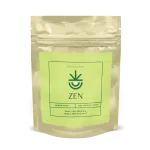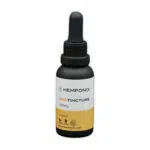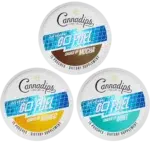
Can CBD Aid Addiction Withdrawal? Insights & Choices by Hemponix
Explore how CBD aids addiction recovery by easing withdrawal symptoms
Connect With Us
The cannabis plant produces 80-100 cannabinoids. The more widely known and studied cannabinoid is Delta-9 tetrahydrocannabinol (THC), which has an analog variant – Delta-8 THC. Then there’s HHC, a lesser-known cannabinoid that has also been getting much attention lately.
Many new compounds and cannabinoid products have flooded the market since states began legalizing the sale of THC products, and it can be challenging to tell which hemp product is right for you.
This article will specifically explore HHC vs. Delta-8 THC to understand the differences, benefits, and risks. To better grasp these differences, it would be best to have a better understanding of cannabinoids.
Table of Contents
Toggle
At the heart of Hemponix’s expertise lies a deep understanding of the intricate molecular dance that defines cannabinoids. Each cannabinoid is a unique constellation of carbon, oxygen, and hydrogen atoms bound in precise arrangements that unlock a spectrum of effects. This molecular architecture is the secret to the distinct properties of Delta-9, Delta-8, and HHC.
Let’s delve into the nuances: Delta-9 THC, celebrated for its robust psychoactive effects, boasts a double bond at its ninth carbon chain. This critical feature influences how it interacts with our body’s receptors. Delta-8 THC, a milder cousin, possesses this double bond on the eighth carbon, shaping its subtler impact. HHC, on the other hand, stands out in the family for its absence of a double bond in its central ring, which confers a unique stability and a different experiential profile.
Understanding these subtle yet profound differences is essential as we curate our Hemponix collection. Our commitment to purity, education, and wellness guides us to select products that resonate with the discerning needs of our customers, whether they seek the invigorating embrace of Delta-9, the gentle touch of Delta-8, or the distinctive experience offered by HHC.
Hexahydrocannabinol (HHC) is a synthesized cannabinoid typically manufactured using THC derived from Cannabis sativa. It was first discovered in 1944 by Roger Adams, an American chemist at the University of Illinois, who used regular Delta-9 THC and added hydrogen molecules to it to change its chemical structure.
That resulted in HHC, a highly potent hydrogenated version of Delta-9 that scientists are still researching. Because it’s a relatively new cannabinoid slowly entering the market, much of the information surrounding it is anecdotal, as it hasn’t been around long enough for researchers to fully understand its side effects, proper dosage, and other therapeutic properties.
Discover the nuanced world of Delta-8 THC with Hemponix, where we appreciate the delicate shifts in molecular structure that bring about a unique canvas of effects. Delta-8 THC, a close relative of the well-known Delta-9 THC, is distinguished by the position of its defining double bond; situated on the eighth carbon chain, it contrasts with Delta-9’s placement on the ninth.
This subtle rearrangement translates into a softer impact on the senses, earning Delta-8 THC the affectionate nickname “cannabis lite.” It’s a gentler voyage into relaxation, offering a less intense high, perfect for those seeking a mild yet satisfying experience.
HHC, while sharing traits with both Delta-8 and Delta-9, carves its own identity. It’s typically milder than Delta-9 yet carries a slightly more pronounced effect than Delta-8. HHC’s charm lies in its balanced potency, capable of delivering a serene calm akin to Delta-8 while still holding onto the more noticeable psychoactive qualities reminiscent of Delta-9 when enjoyed in greater quantities. At Hemponix, we celebrate these variations, offering a curated selection to match your desired journey into wellness and tranquility.
Studies indicate that HHC is closer to Delta-9 in intoxication but bears more similarities to Delta-8. Therefore, HHC’s effects are very similar to THC, so higher doses (over 20mg) have energizing and euphoric effects, while lower doses produce more calming, lightheaded effects like Delta-8 THC.
Delta-8 THC is known to have the following benefits:
HHC provides the best of both worlds, and its effects spread across a broader spectrum. These effects include:
The reason why HHC’s impact varies widely is highly hinged on the way the compound is manufactured. A well-formulated HHC product combines two HHC molecules:
Manufacturers have yet to determine the best way to isolate high-potency HHC molecules from low-potency molecules. Because of that, most HHC products feature a blend of the two molecules, and the effects vary based on the product you choose.
Since the introduction of smokeable cannabis in the US in the early 1910s, people have extracted cannabinoids for medical purposes. Although most studies have focused on Delta-9 THC and CBD, researchers have begun studying HHC and its potential benefits in depth.

Anecdotal evidence indicates that HHC produces similar therapeutic effects to THC. We can rely on these findings since the molecules’ chemical structures are similar and have the same affinity to the body’s endocannabinoid receptors. Here are some conditions that researchers believe HHC may treat:
When tested on lab rats, HHC showed strong pain-relieving effects. Although scientists are yet to test it on humans, studies have shown promising therapeutic outcomes of using HHC as a pain reliever and point to it as a viable medicine for chronic pain management.
HHC’s psychotropic effects are believed to be caused by its interaction with CB1 receptors in the brain. The compound’s mechanism of action is unknown, but research shows that activating the CB1 receptors (in this case, by Delta-9 THC) may improve sleep quality.
Most cannabinoids combat pain and reduce inflammation effectively. Since HHC’s molecular structure matches Delta-8 and Delta-9, it’s reported to have similar properties. Although experts haven’t researched HHC for pain yet, one study indicated that hydrogenated THC binds well with CB1 receptors in the brain and may reduce inflammation in joints.

Only a few studies provide insights into the potential therapeutic benefits of delta-8 THC. Most of its clinically significant effects come from anecdotal evidence and assumptions based on its similarity to delta-9 THC (which has been extensively researched).
One thing that makes Delta-8 a suitable cannabinoid for anxiety relief is that it delivers a milder “high” than Delta-9. Therefore, it’s believed to cause much less anxiety than regular THC and a lighthearted high that enhances focus and clarity. Besides, its anxiety-relieving properties are consistent regardless of the dose. We can’t say the same about Delta-9.
Scientists have studied Delta-8 and Delta-9 and reported promising outcomes. Delta-8 reportedly reduces nausea more effectively than Delta-9, as it doesn’t cause any significant side effects.
One preclinical study in 2018 showed that topical administration of Delta-8 significantly reduced pain and inflammation in eye injuries. The research showed that this medicinal property is achieved by activating CB1 receptors, which control critical body functions, such as pain, sleep, and metabolism.
Delta-8 is also believed to be a stronger stimulant than Delta-9. When tested on mice, scientists observed that Delta-8 increased the feeding patterns by up to 22%.
When consumers react sensitively to HHC, they experience side effects similar to when consuming high doses of THC. Users report the following side effects after consuming HHC:
On the flip side, Delta-8 is less potent than HHC. Its consumption is known to cause side effects, including:
Navigating the intricate landscape of cannabinoid legality, Hemponix is acutely aware of the complex status surrounding HHC and Delta-8 THC. While THC is federally classified as a Schedule I substance, the nuances of HHC and Delta-8’s legality hinge on interpretations of their natural versus synthetic origins.
Manufacturers of HHC products assert its legality across the United States, a stance mirrored by advocates of Delta-8. The crux of the matter lies in the classification—if deemed natural constituents of hemp, they may be lawful under federal regulations when present in concentrations of less than 0.3% THC. Conversely, if classified as synthetic, they could face prohibition.
The choice between HHC and Delta-8 THC ultimately aligns with your preferences. HHC is often favored for its gentler euphoric effects, while Delta-8 might be sought after for a stronger psychoactive experience. At Hemponix, we pride ourselves on providing farm-to-table cannabis-infused products, including HHC, CBD, CBN, Delta-9, Delta-8, and CBG.
Our commitment to excellence begins with the seed, ensuring every Hemponix product stems from genetically superior cannabis strains cultivated to yield stability and potency. It’s our promise that with Hemponix, you’ll encounter the same reliable, high-quality experience with every use, in full compliance with the intricate tapestry of cannabinoid regulations.

Explore how CBD aids addiction recovery by easing withdrawal symptoms

Discover how THCA is defining Colorado’s cannabis landscape. This article

Explore how CBD can potentially ease anxiety disorders by calming
Explore how CBD aids addiction recovery by easing withdrawal symptoms...
Read MoreDiscover how THCA is defining Colorado's cannabis landscape. This article...
Read MoreExplore how CBD can potentially ease anxiety disorders by calming...
Read MoreYOU MUST BE 21 YEARS OF AGE OR OLDER TO VIEW OR SUBMIT INFORMATION TO HEMPONIX.COM
FDA DISCLAIMER: THESE STATEMENTS HAVE NOT BEEN EVALUATED BY THE FOOD AND DRUG ADMINISTRATION. THIS PRODUCT IS NOT INTENDED TO DIAGNOSE, TREAT, CURE, OR PREVENT ANY DISEASE.
About Us
YOU MUST BE 21 YEARS OF AGE OR OLDER TO VIEW OR SUBMIT INFORMATION TO HEMPONIX.COM
FDA DISCLAIMER: THESE STATEMENTS HAVE NOT BEEN EVALUATED BY THE FOOD AND DRUG ADMINISTRATION. THIS PRODUCT IS NOT INTENDED TO DIAGNOSE, TREAT, CURE, OR PREVENT ANY DISEASE.















